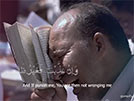
With only a few days left to go in the holy month of Ramadan, Muslims who observe the fast fall into two broad categories.
Some are so used to the rhythms of fasting that it feels almost natural at this point.
For others, the final stretch is psychologically and physically the hardest.
This year poses an even greater challenge, with Ramadan falling during some of the longest and hottest days of the year, requiring a fast of 15 or more hours in some parts of the world.
The dramatic change from regular eating habits can take a toll on an one’s health and energy, and makes it difficult to keep up a regular fitness regimen.
But there are ways to turn it around.
Here are some tips to make a Ramadan fast beneficial, rather than damaging, to your health:
Eat meals, not feasts
When the body is starved of food, it burns fat to make energy, which can help shed the pounds.
But that benefit can be lost with excessive feasting at the post-sundown meal, the iftar.
Dr. Terry Meriden, an endocrinologist at the Thyroid & Metabolism Clinic in Peoria, Illinois, tells Quartz that it’s important to limit portions, or an opportunity to lose weight could be wasted.
Although it might seem like the natural reaction to overstuff your stomach when it is finally time to eat, overeating causes discomfort in the abdomen, and pretty much rules out all hopes of being active after eating.
The same goes for water.
There is no reason to down your recommended eight glasses as soon as the sun sets.
Sip, don’t chug, to gently rehydrate.
Wake up for the pre-dawn meal
An integral part of Ramadan is suhur, the traditional pre-dawn meal, but many lack the stomach for a meal in the dark before sunrise.
Since the month only offers the observant few opportunities to eat and drink, it’s important to use all of them to get through the daylight hours.
For this meal, eat food that will release energy throughout the day.
In order to stay full, stick to high-fiber, high-protein foods, with healthy fats such as avocado.
And it doesn’t hurt to plan ahead. Boil a dozen hardboiled eggs, make smoothie packets to keep in your freezer, bake a batch of bran muffins, or prep some oatmeal with nuts and fruit to make your morning routine a little easier.
Work out before eating
When you haven’t consumed food or drink all day, the thought of exercise might sound terrifying.
But experts say it’s important to maintain an active lifestyle, though they recommend low-intensity workouts.
Dr. Meriden suggests working out in the pre-dawn hours, before suhur.
If you’re not an early riser, Nadia Amrikani, a personal trainer at Boston gym Physique who observes the fast, suggests exercising at iftar, after drinking water and eating a portion of complex carbs and veggies—then munching on proteins when you’re done.
Ramadan also provides an opportunity to switch up workouts to more weight training or interval training, since cutting down cardio is recommended.
“This gives your body a change from routine and will most likely see definite results,” Amrikani tells Quartz.
Yoga, Pilates, and swimming are popular choices, since they don’t involve sweating profusely, which makes water cravings intense.
Light exercise can also help to distract you from thinking constantly about food and drink.
Eat right and stay hydrated
Many welcome the opportunity to burn fat, but fasting for a long period of time can eventually make your body break down muscles for energy, which is less desirable.
To prevent muscle-breakdown, meals should consist of complex carbohydrates, healthy fats, and protein to help release energy slowly throughout the day.
Those foods will also make you feel more full, which is a plus.
Avoiding caffeine is a good idea, since caffeinated drinks can dehydrate you. Additionally, fasting all day can escalate your sugar cravings, but it’s important not to overindulge in those post-sunset dates or pastry to avoid weight gain.
“Give your body what it needs, not what it is asking for,” says Amrikani.
Remind yourself why you’re doing this
Often forgotten, the annual fast, one of the five pillars of Islam, is also the total commitment of the person’s mind.
So when the last stretch gets difficult, it is important to remember why you began the fast in the first place.
The month is a period of self-growth.
It provides the opportunity to practice self-restraint, cleanse the body and soul of impurities, and build a sense of community.
It can also offer a sense of solidarity with those who can’t afford food or material goods, and help inspire charitable acts throughout the year.
This article borrowed from Ahl-ul-Bayt.org
 Healthy Tips for Ramadan - Islam Guidance
Healthy Tips for Ramadan - Islam Guidance









